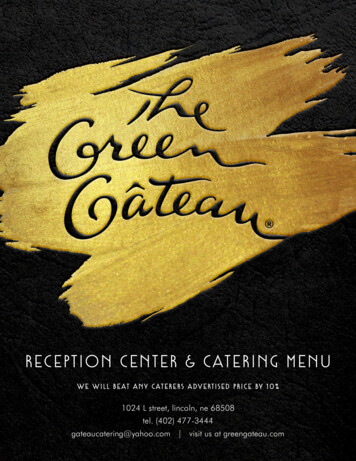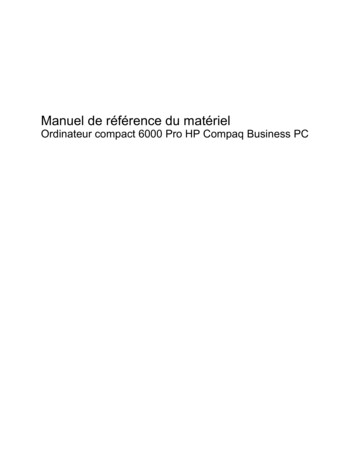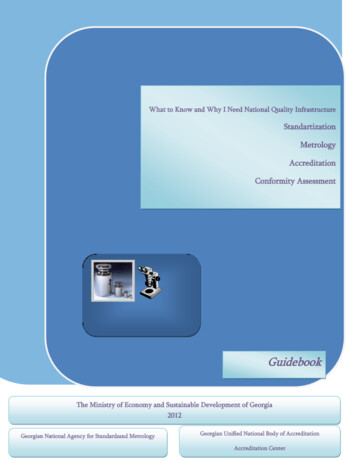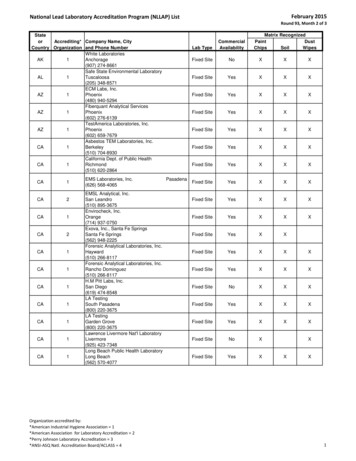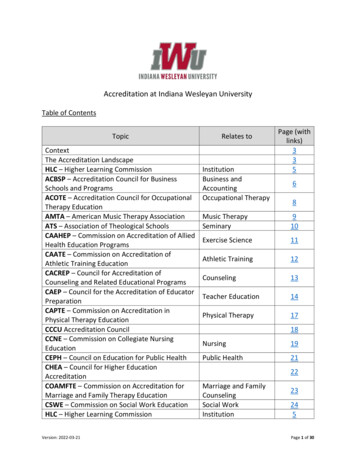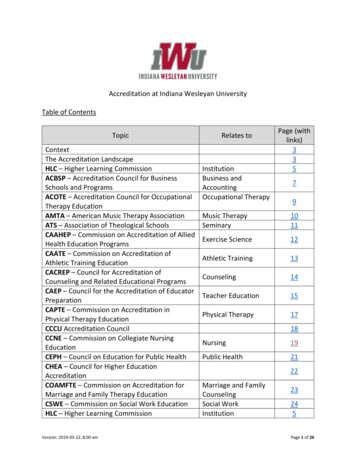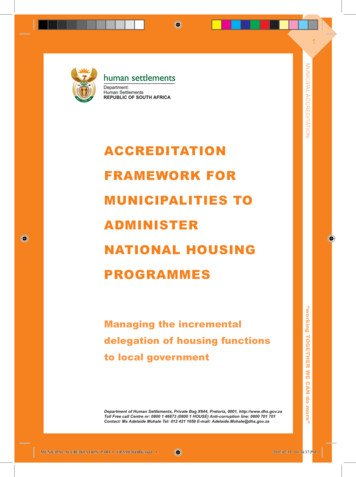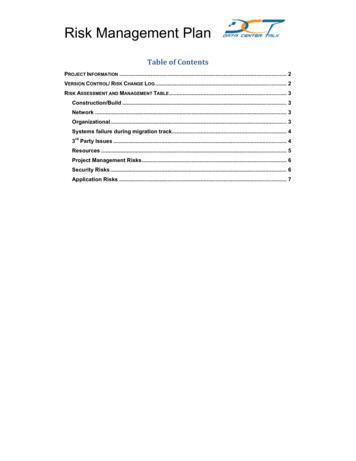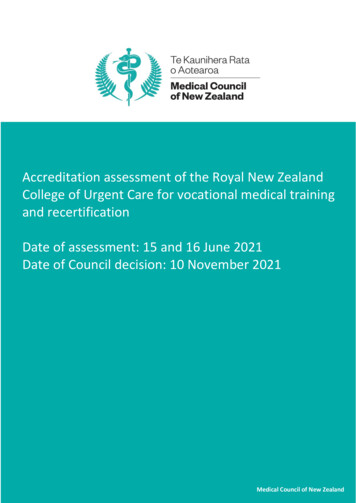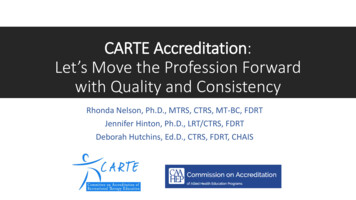
Transcription
CARTE Accreditation:Let’s Move the Profession Forwardwith Quality and ConsistencyRhonda Nelson, Ph.D., MTRS, CTRS, MT-BC, FDRTJennifer Hinton, Ph.D., LRT/CTRS, FDRTDeborah Hutchins, Ed.D., CTRS, FDRT, CHAIS
SessionObjectives1Identify three ways CARTE accreditationcontributes to enhanced quality of RT/TRacademic preparation.2Give an example of how CARTEaccreditation contributes to consistency ofRT/TR academic preparation.3Discuss how CARTE accreditation canpositively impact NCTRC credentialing andprofessional practice.
ATRA Higher Education Task Force (HETF) Was charged with investigating status of Education inRT/TR Goal to provide insight on educational needs for theprofession Collected data from over 2500 RT professionals,educators, and students Two year process (2016-2018) Data used to make recommendations to the professionAdvancing the RT Profession
Key recommendations included the following:1. Require all TR/RT curricula to showconsistency in learning outcomes that reflectentry-level competencies in the field.2. Incorporate new and increasing levels ofcompetencies into RT/TR curricula.3. Improve the infrastructure for a graduatedprogression of quality fieldworkexperiences.CARTE Accreditation is a means for achieving all of these.Recommendations of the ATRA HETF
Accreditation A process of validating of competence, credibilityand/or authority. The primary way that students, families, employersand the public know that institutions provide a qualityeducation. The accreditation process compares the institutionand/or programs to educational and professionalstandards determined by specific accreditationorganizations. Types of accreditation included: Institutional vs Program Regional vs Professional
Program Accreditation Provides an evaluation and judgments of institutionsand programs. Accreditation ensures access to qualified instructors,adequate curriculum and necessary support services. Offers guidelines that influence decisions regardingan educational program including: specific student outcomes (knowledge, skills, andabilities), the number of hours of a particular subject areaoffered, and the types of learning experiences studentsundertake.
Council for Higher Education Accreditation An organization for degree-granting colleges anduniversities in the U.S. Purpose provides national advocacy for self-regulationof academic quality through accreditation in order tocertify the quality of higher education accreditingorganizations, including regional, faith-based, privatecareer, and programmatic accrediting organizations. CHEA has approximately 3,000 academic institutions asmembers, and currently recognizes approximately 60accrediting organizations.
Commission on Accreditationof Allied Health Education Programs A 501 (C)(3) tax exempt organization founded in 1995. A programmatic postsecondary accrediting agency recognized bythe Council for Higher Education Accreditation (CHEA). Carries out its accrediting activities in cooperation with 25review committees (Committees on Accreditation). CAAHEP currently accredits over 2200 entry level educationprograms in 32 health science professions including RecreationalTherapy.
Committee on the Accreditation ofRecreational Therapy Education In April 2010, CARTE & ATRA made application to CAAHEPto: Recognize Recreational Therapy as an allied health profession, Accept ATRA as the sponsor for academic accreditation, and Accept CARTE as the Committee on Accreditation for RecreationalTherapy Education. Standards and Guidelines for Accreditation of RecreationalTherapy Education were initially accepted by CAAHEP onAugust 20, 2010. CARTE standards were revised and approved by CAAHEP inJuly 2017.
Standards and Guidelines for Accreditation ofRecreational Therapy Education Sponsorship Program Goals and Outcomes Resources Personnel: Program Director, Faculty, ClinicalInstructors Curriculum: classroom/lab space, competencyrequirements Student Evaluation and Outcomes Fair Practices Curriculum Competency Requirements
Require all TR/RT curricula to show consistency inlearning outcomes that reflect entry-levelcompetencies in the field.HETF Recommendation
It is imperative that we improve the consistency ofa bachelor’s degree in TR/RT.Consistency inLearningOutcomesThe key to consistent academic curricula is programaccreditation.The Committee for Accreditation of RecreationalTherapy Education (CARTE) through theCommission on Accreditation of Allied HealthEducation Programs is best positioned for this task.
ThroughCARTEAccreditation,ProgramsMust:1Ensure the achievement of program goals andlearning domains.2Develop instruction that is an appropriatesequence of classroom, laboratory, and clinicalactivities.3Base instruction on clearly written course syllabithat include course description, courseobjectives, methods of evaluation, topic outline,and competencies required for graduation.4Demonstrate that it meets or exceeds thecontent and/ or competencies specified inAppendix B.
CARTEStandards –ProgramGoals &LearningDomainsThere must be a written statement of theprogram’s goals and learning domains consistentwith the expectations of the various communitiesof interest served by the educational program.Provide the basis for program planning,implementation, and evaluation.Must be compatible with the mission of thesponsoring institution(s), the expectations of thecommunities of interest, and nationally acceptedstandards of the roles and functions.Based upon the substantiated needs of healthcare and human service providers and employers,and the educational needs of the students servedby the educational program. (advisory board)
All CARTE Accredited programs must have thefollowing goal defining minimum expectations:CARTE Standards –Program Goals &Learning Domains“To prepare competent entry-levelrecreational therapists in thecognitive (knowledge), psychomotor(skills), and affective (behavior)learning domains. “
Evaluation of students must be conducted on a recurrent basis and withsufficient frequency to provide both the students and program faculty with validand timely indications of the students’ progress toward and achievement of thecompetencies and learning domains stated in the curriculum.The program must periodically assess its effectiveness in achieving its statedgoals and learning domains.CARTE Learning Outcomes
CARTE sets Minimum Thresholds for Program Quality Outcomes assessments must include, but are not limited to: National credentialing examination performance Programmatic retention/attrition Graduate satisfaction Employer satisfaction Job (positive placement) Programmatic summative measures
Incorporate new and increasing levels ofcompetencies into RT/TR curriculaHETF Recommendation
Original CARTE standards developedto align with NCTRC standards currentat that time CARTE standards enhanced andmodified since OG CARTE standards currently exceedNCTRC standards If a student follows the curricula frombeginning to end in a CARTEaccredited program, they will meetNCTRC eligibility requirements.NCTRC Certification Standards andCARTE Accreditation Standards
NCTRC Academic Path Requirements for Eligibility Review(modified from the current NCTRC ome-a-ctrs/ ) Enrollment in a baccalaureate degree or higher from aregionally accredited college or university with a major in (a) therapeutic recreation (recreation therapy); (b) recreation or leisure with an option in therapeuticrecreation; (c) therapeutic recreation, recreation, or leisure incombination with other fields of study (e.g., TherapeuticRecreation and Health Studies; Recreation and SportManagement; Leisure and Tourism); and (d) a major in another field of study with ificate inrecreation therapy/therapeutic recreation. Therapeutic Recreation Content Courses: A total of 18semester.hours of therapeutic recreation and generalrecreation content coursework with no less than a minimumof 15 semester hours in therapeutic recreation content. Aminimum of five (5) courses in therapeutic recreation processis required and each course must be a minimum of three (3)credit hours. Supportive Courses: A total of 18 semester hours (3) semester hours or of anatomy and physiology (3) semester hours abnormal psychology (3) semester hours human growth and developmentacross the lifespan. The remaining semester hours or quarter hours ofcoursework must be fulfilled in the content areas of socialsciences and humanities.
ConsideringCourseContentNCTRC courseworkstandard:“ .no less than aminimum of 15 semester hours in therapeuticrecreation content. Aminimum of five (5)courses in therapeuticrecreation process isrequired and each coursemust be a minimum ofthree (3) credit hours.” THIS STANDARD ISCHANGING TO 6courses, which meansthat most programshave 6 courses now.Question: How manyTR/RT programscurrently are offering 5courses in therapeuticrecreation process andmeeting only theminimum requirement?BIGGER Question:What is the content ofthose 5 courses?
CARTE standards look at academicpreparation using an overall curriculumfocus.CARTEAccreditationStandardsCARTE evaluates quality academicpreparation by content (meeting specificcurriculum content competencies- quality v.quantity).Standards do not have to be met in aspecific course, but must be present in thecurriculum at an appropriate depth toprepare students for entry-level practice.
CARTEStandards:Appendix BCurriculumContentCompetenciesPlease note in your handout that there aredetailed competencies for BOTHknowledge and skill in: Foundations All areas of the APIE process (4) Management Support coursework (A&P, Abnormal Psych,Human Growth & Dev) Additional recommend curriculumcompetencies (e.g., motor learning,counseling, group dynamics, pharmacology,etc.) Clinical education experiences (more than justinternship)
Examples:How can the CARTE Accreditation Process Improve a RT/TRProgram?SRU and WCU
Please look at your handout outlining differences in CARTE curriculafor 8-semester plans across ProgramsWCU A vs. WCU BCurriculumSamples –OverallModels Gained courses in: research and evaluation (2) ID/DD (1) clinical labs (4) modalities courses (6) More strategically examined our SWOT through the CARTE accreditation processes.Slippery Rock University Gained: lab space funds for equipment & supplies release time for program director recognition as a health & human services profession increased budget (through lab fees) leadership/involvement in the IPE program
Curriculum Sample: AssessmentWCUSRU1. 2.3.APIE process overall in foundationscourse (200/ soph fall)Concepts intro (352/ soph spring)Content learned/ skills practiced 4 RTlecture and lab courses (junior)1.2.3.4.4.5.340/341- ID/DD350/353- Phys dis360/361- Older Adults405/406- PsychService learning labs are key clinicalcomponents for us10 classes totalRCTH 120 Inclusive Leisure Services – 1RCTH 220 RT Services- 2RCTH 232 RT Phys Dis – 6RCTH 233 RT Mental Health – 5RCTH 314 Clinical Aspects RT – 10RCTH 317 – Organization & Management – 2RCTH 319 – Client Assessment in RT – 14RCTH 320 RT Program Design – 8RCTH 420 RT Older Adults – 6RCTH 422 RT Interventions I – 3RCTH 423 RT Interventions II – 5 11 classes total
Improve the infrastructure for a graduatedprogression of quality fieldwork experiences.HETF Recommendation
Current NCTRC Fieldwork/Internship Requirement Completion of a internship experience in accordance with NCTRCStandards:“A minimum 560-hour, 14 consecutive week internshipexperience in therapeutic recreation services that uses thetherapeutic recreation process as defined by the current NCTRCJob Analysis Study under the supervision of both academic andagency internship supervisors who are NCTRC CTRS certified.The agency supervisor must also possess the CTRS credentialfor one year prior to supervising an internship student. Anacceptable internship experience is one which is completedafter the majority of required therapeutic recreation andgeneral recreation coursework is completed as verified on theofficial transcript”
The curriculum must provide clinical experiences, includingclinical education/practicum and clinical internship/fieldplacement, under the direct supervision of a qualifiedclinical instructor in an appropriate setting.CARTEStandards forClinicalExperiencesStudents must have opportunities to practice and integratethe cognitive learning, with the associated psychomotorskills requirements of the profession, in accordance withprofessional standards of practice to develop entry-levelclinical proficiency and professional behavior.The clinical experiences should allow studentsopportunities to practice with different consumerpopulations and in different settings.
The clinical internship or field placement must meet therequirements of the national credentialing organizationand state laws and regulations for certification, registrationor licensure.CARTEStandards forClinicalExperiences(continued)Competencies for practice as a recreational therapist mustbe a focus of development during the clinical internship orfield placement experience.In order to establish consistency in practice, competenciesfor practice as a recreational therapist and performanceduring the clinical internship must be assessed on theCARTE Clinical Performance Appraisal Summary Form.It is also recommended that agencies utilize the"Competency Self-Assessment Detail Form" (ATRA, 2008,pp. 31-54) for student self-assessment of competenciesfollowing the internship/field placement experience.
CARTEStandardsregardingOversight ofClinicalExperiences byProgramDirectorMust establish criteria for sites that provideclinical education experiences for students.Required to evaluate on an annual andplanned basis all clinical education sites wherestudents are gaining clinical experience.Responsible for making sure clinical instructororientation and evaluation takes place.Must ensure regularly planned communicationbetween the program and the clinicalinstructor.
Key recommendations include the following:1. Require all TR/RT curricula to showconsistency in learning outcomes that reflectentry-level competencies in the field2. Incorporate new and increasing levels ofcompetencies into RT/TR curricula3. Improve the infrastructure for a graduatedprogression of quality fieldwork experiencesCARTE Accreditation is a means for achieving them all.Review of HETF Recommendations
ATRA PositionStatementonAcademicAccreditationFriday, Aug 9, 2019https://www.atra-online.com/news/news.asp?id 465072&hhSearchTerms %22accreditation%22ATRA believes that a single form of academic programaccreditation is essential in ensuring consistent content and rigoramong undergraduate recreational therapy programs.One of ATRA’s Guiding Principles is our belief in “evidenced basedpractice, professional credentialing, and accreditation” (ATRA,2015).Additionally, one of the key findings from the ATRA HigherEducation Task Force was to strengthen and standardizeundergraduate recreational therapy curricula.
ATRA PositionStatement onAcademicAccreditation(continued)In support of our guiding principles, findings from the HigherEducation Task Force, and in support of consistent RT educationalexperiences, ATRA sponsors the Committee on Accreditation ofRecreational Therapy Education (CARTE).ATRA believes accreditation through CARTE is the best method forensuring consistent content and rigor within undergraduate RTeducational programs due to its sole focus on curriculumcompetencies related to recreational therapy.
Call to Action In light of the findings of the Higher Education TaskForce and ATRA’s Position Statement on AcademicAccreditation, we believe it is imperative that ALLacademic programs in the profession (RT/TR): Use CARTE Accreditation Standards as the basisfor their curriculum Work towards CARTE Accreditation for theirRT/TR Program Doing so is the clearest path to quickly andefficiently improve the consistency and quality ofrecreational therapy education. This benefits us all.Let’s move the profession forward!
Questions/Discussion
regionally accredited college or university with a major in (a) therapeutic recreation (recreation therapy); (b) recreation or leisure with an option in therapeutic recreation; (c) therapeutic recreation, recreation, or leisure in combination with other fields of study (e.g., Therapeutic

